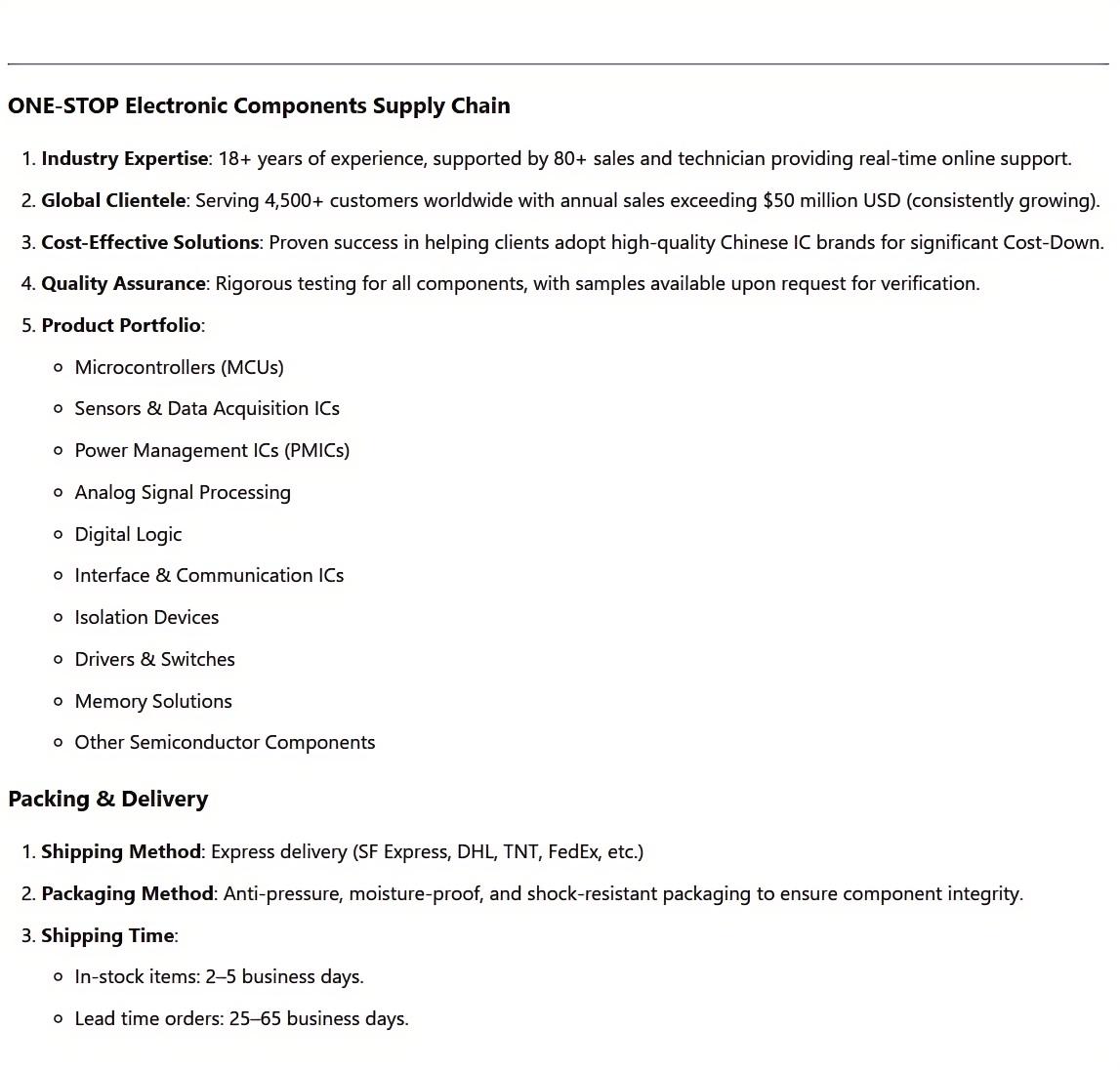π140M30S is a Replacement parts of
ADUM1445ARQZ-RL7/ADUM1445ARQZ
Mfr.Part No. :
π140M30SManufacturer :
2Pai SemiDescription :
Enhanced ESD, 3.0 kV rms/5.0 kV rms 10Mbps Quad-Channel Digital IsolatorsPackaging :
ReelPackage :
NB SOIC-16, WB SOIC-16, SSOP16Stock :
In stockPrice :
$0.60-$0.95
π140M30S
| Price: | $0.60-$0.95 | $3.0-$4.9 |
|
Replace parts:
Replacement parts:
Alternative parts:
Pin to pin parts:
|
π140M30S |
ADUM1445ARQZ-RL7
ADUM1445ARQZ
|
The π140M30S and ADuM1445ARQZ series are both high-performance isolation chips designed to offer reliable signal transmission with galvanic isolation. While both products provide strong isolation capabilities, the π140M30S distinguishes itself with enhanced robustness, lower power consumption, and improved data rate handling. This makes it more suitable for demanding industrial applications where high speed, low latency, and system efficiency are paramount.
The π140M30S supports higher data rates with lower latency, which is essential in high-speed communication and control systems. Its ability to handle fast data transmission with minimal signal distortion ensures stable performance in applications that require real-time data processing. On the other hand, the ADuM1445ARQZ series, while capable of reasonable data rates, may experience slight signal degradation when operating at high frequencies or in complex environments, potentially limiting its effectiveness in demanding applications.
Both the π140M30S and the ADuM1445ARQZ series provide robust isolation features, but the π140M30S offers superior isolation voltage capabilities. It ensures higher protection against voltage surges, transients, and ground loops, which is crucial for industrial, automotive, and telecommunications applications that demand high-voltage tolerance. The ADuM1445ARQZ series, while offering solid isolation performance, has a relatively lower isolation voltage rating in comparison, making it less suitable for high-voltage environments where stronger isolation is required.
The π140M30S excels in power efficiency, particularly in low-power applications. It provides excellent performance with minimal energy consumption, making it ideal for battery-operated and energy-sensitive systems. In contrast, the ADuM1445ARQZ series has a slightly higher power consumption, particularly when operating at higher data rates, which can lead to inefficiencies in power-sensitive designs. This makes the π140M30S a more optimal choice for energy-efficient systems, especially in portable and IoT devices.
The π140M30S offers an extended operational temperature range, allowing it to perform reliably even in harsh environmental conditions. This extended range makes it a strong candidate for industrial and automotive applications where temperature fluctuations are frequent. The ADuM1445ARQZ series has a narrower operating temperature window, which could limit its use in extreme conditions, making it less adaptable to industries requiring high environmental resilience.
The π140M30S offers compact packaging options, reducing PCB space requirements while maintaining high-performance isolation. This is a crucial advantage for systems where space is at a premium, such as compact designs or highly integrated systems. In comparison, the ADuM1445ARQZ series, while relatively compact, may require more board space for similar functionality, limiting flexibility in space-constrained applications.
The π140M30S is engineered for superior long-term reliability, with a focus on maintaining stable performance even under demanding operational conditions. Its enhanced durability ensures fewer failures and longer lifespans, particularly in mission-critical industrial systems. In contrast, while the ADuM1445ARQZ series is reliable, it may not match the π140M30S in terms of resilience under continuous stress, especially in high-reliability applications that require utmost durability.
Both chips are designed for industrial, automotive, and telecommunications applications. However, the π140M30S is better suited for applications that require higher isolation, higher data throughput, and more stringent power efficiency requirements. Its versatility in harsh environments and its ability to handle high-speed data transfer make it ideal for complex systems in industrial automation, automotive electronics, and communication networks. The ADuM1445ARQZ series, though reliable for general isolation tasks, may not perform as efficiently in high-speed, high-voltage, or power-sensitive applications.
In conclusion, the π140M30S offers a more robust solution compared to the ADuM1445ARQZ series, especially when it comes to isolation voltage, power efficiency, temperature resilience, and data rate handling. Its superior performance makes it the optimal choice for high-speed, high-reliability applications in industrial, automotive, and telecom environments. While the ADuM1445ARQZ series remains a reliable solution for standard isolation needs, it does not match the π140M30S in terms of performance, efficiency, or adaptability to extreme conditions. Therefore, the π140M30S is the preferred choice for demanding and high-performance systems.

Hot Tags :